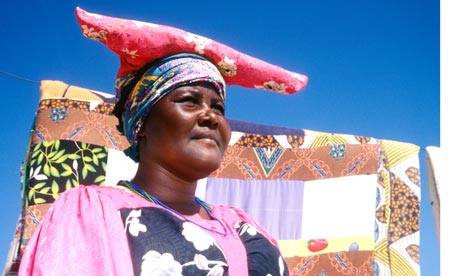Herero [Namibia] Woman Wants Justice for German Genocide and ? of Women
Options
Amotekun
Members Posts: 7,820 ✭✭✭✭✭

The 1904–1908 genocide against the Herero is considered the first in the 20th century. Now the surviving descendants want their land back
Over the weekend, Geoffrey York, the Africa correspondent for the Canadian Globe and Mail (and apparently also the only correspondent for a major Canadian publication on the African continent) wrote, from Namibia, about the current Herero struggle for land, dignity, and reparations. The 1904–1908 German genocide against the Herero is considered by many to have been the first genocide of the twentieth century, as such it serves as the gateway to the Modern Age.
As York, accurately, describes the situation, nothing much has changed:
In the bush and scrub of central Namibia, the descendants of the surviving Herero live in squalid shacks and tiny plots of land. Next door, the descendants of German settlers still own vast properties of 20,000 hectares or more.
The Herero want their land back. They would prefer the State find a way, but if not, land invasions will do. That option is described as "a new kind of radicalism."
York ends his article with an old kind of European, and North American, representation, that of the tired old African woman:
A Herero grandmother named Gendrede Kavari lives on a small dusty plot of land on the edge of Okakarara. Once she had a few animals, but she had no fence and they were stolen. Now she survives on a pension and a small income from collecting firewood. Some day, if she had a bit more land, she would like to have some goats. 'We must get our land back,' she says.
Gendredi Kavari was never meant to survive. Neither were her grandmothers and great grandmothers.
Comments
-
Germans butchered somewhere between 50 and 80% of the Herero population in a mere four years, and Herero women were special targets. Germany used a Herero uprising to justify the "streams of blood" program of annihilation. That uprising was partly inspired by Herero resentment at German sexual violence against Herero women.
In 1903, after 20 years of colonization, 712 European women lived among 3,970 European men in German South-West Africa. What to do? ? . Although ? by German men of Herero and Nama women was common, prior to 1904 not a single case of a white man ? an African woman came before a German court. This became particularly acute in the attempted ? , and then murder, of Louisa Kamana.
Louisa Kamana was married to the son of Chief Zacharias. The two gave a ride to a German settler, who, that night, "made sexual advances" on Louisa Kamana. She refused. He killed her. The Court acquitted him. The case was appealed, and the settler was given three years in prison. ? and murder of Herero women were common occurrences. The case only went to trial because a Chief's family was involved, and no one among the Herero thought three years made up for a Herero woman's life and dignity.
That's the story of the genocide as well. Women and children were targeted. When the Herero were 'allowed' to escape into the Kalahari Desert, it was assumed most would die. It was also assumed more women and children would die. That assumption was correct. The German authorities explained that Herero women and children had to die because they carried dangerous diseases. Meanwhile, the German press shrieked that Herero women were 'black amazons swinging clubs and castrating their foes'.
And so good riddance.
When concentration camps were established for the few survivors, one female-only camp was set up to 'service' the German troops. Sound familiar? As Herero leader Mburumba Kerina explained: "Hey, that's my grandmother — a comfort woman." In the other camps, along with sexual violence at the hands of settlers and troops, Herero women were forced to boil heads, often of their own family members, and then scrape off the flesh with shards of glass. Those skulls were then shipped off to museums and universities, as well as anthropological and private collections in Germany, providing decades of 'scientific' research as well as 'entertainment.'
-
To date, only a few Herero remains have been returned, while the overwhelming majority remains in Germany.
Sexual violence was part of the colonization and subjugation process. From ? and murder to abduction and sex slavery to forced removal of women, German settlers and the German Empire had a special fate in store for Herero women.
So, when you read about the Herero grandmother named Gendrede Kavari who only wants a bit of land and perhaps some goats, remember the reparations not paid. Remember the debt never even acknowledged. It's about more than a bit of land and perhaps some goats. It's about time that debt was paid — with interest.
-
Blacks losing as usual.
